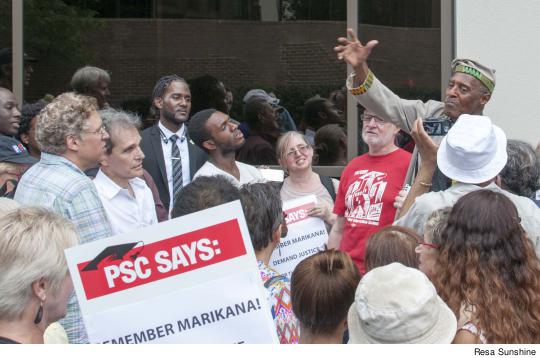 |
EDITOR’S NOTE: Three years ago, the land outside the Lonmin platinum mine in Marikana, South Africa, was the scene of brutal anti-worker violence when 34 striking miners were killed by police, in apparent collusion with the mine owners. It was a bitter turn for a nation emerging from apartheid, the racial segregation imposed by the white descendants of colonial rulers, and the new South Africa showed that the struggle for workers’ rights and dignity had not been settled with the return of the nation to its people in 1994.
To commemorate the lives of the dozens who died in Marikana, and honor the 112 miners who sustained bullet wounds in the police attack – as well as the struggles of working people everywhere – the International Committee of PSC convened a rally outside the South African consulate in Manhattan’s Murray Hill neighborhood on August 16, on the anniversary of the Marikana massacre.
A commission of inquiry, headed by retired judge Ian Farlam, was tasked by President Jacob Zuma with investigating the massacre, and conducted its proceedings in public for a total of 293 days, according to the Guardian. The resulting report contains material that is damning of police and the mining company, in addition to evidence that several individual miners committed acts of inexcusable violence.
Those who were cut down on August 16, 2012, were not among the violent protesters. Led by a rock driller known as Mambush, the miners were attempting to assemble on the land outside the shantytown where they lived when they were encircled by police, who shot them. The worst was reserved for Mambush, who took 14 bullets for being the leader of men doing the most dangerous of work in a fight for a decent wage.
The commission of inquiry delivered its final report to Zuma in March 2015; the president waited until June 26 to release it.
To PSC Treasurer Sharon Persinger, the incident at Marikana holds a special resonance. The granddaughter of a West Virginia coal miner, Persinger knows, first-hand, the difficulties faced by those who do the dangerous work of extracting riches from the earth. (See “Born to Organize,”) Here, we present an adaptation of the remarks she delivered at the Remember Marikana! Rally.
______________________________
I’m originally from West Virginia. I grew up in a community that had been a coal camp, surrounded by miners and, at that time, strongly unionized miners. So I want to make a connection between miners in the US and the workers who were slain at Marikana. When I started thinking about what I would say, I did just a little research to find that massacres of striking miners were once very common in the United States. Say the words Ludlow, Lattimer, the Columbine Mine, Anaconda Road and the Battle of Blair Mountain, and those who know the history of US miners know that these references represent lives lost by hundreds of miners who were fighting together for the right to a decent life.
So I was led to think, why is this? Why did they risk so much? Well, miners have to work together; it’s a very dangerous occupation. Whether you’re underground or above, you’re doing difficult work to wrest rock and minerals from the ground. It involves explosives and heavy equipment and roofs that could fall in on you. Miners were early to organize, and they organized for very basic things: a living wage, safe working conditions, health benefits for themselves and their retirees, the basics that all workers need to live. They understood they could win better working conditions only by working together with the solidarity of a union.
Keeping Solidarity
So they organize and they pressure and when they get nowhere, they go out on strike. Sometimes they win some things and sometimes they don’t, and the police or the army gets called in and they shoot the striking miners.
Now for the connection to those of us here: Remember that you likely have a worker of this sort in your family history – I’m sure some of you do – you have a father or a mother who was a factory worker or a miner or a steel worker, and they organized for better pay and safe working conditions. That good job meant the realization of their desire that you, as their descendants, could get an education and didn’t have to work in a mine or a factory or any of those places where you take your life in your hands every day when you go to work.
Remember that. Remember your connection to workers. Even if you’re a high school teacher or a college professor, you’re a worker and the child of workers, and I want you to keep that solidarity with them.

